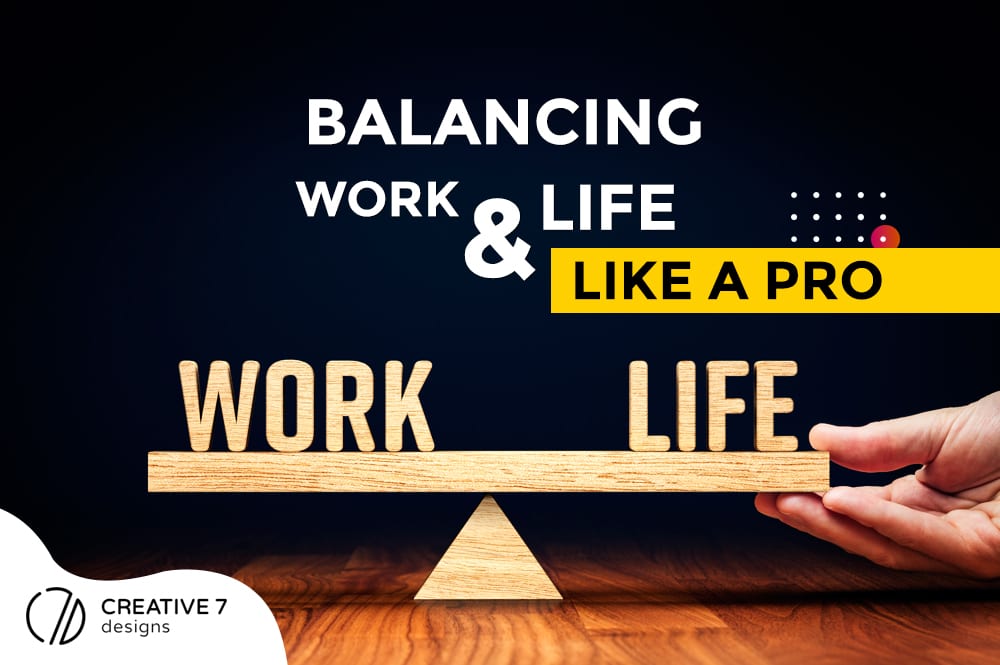Summary: Learn how to balance work and personal life like a pro with these simple suggestions.
 Maintaining a work-life balance is about separating personal matters from professional ones. Neither aspect of a person’s life should infringe upon the other — yet, both are important — yet, neither should be neglected.
Maintaining a work-life balance is about separating personal matters from professional ones. Neither aspect of a person’s life should infringe upon the other — yet, both are important — yet, neither should be neglected.
The above might sound like some crazy word problem, but balancing business and personal matters is actually doable. Here are some things we’ll be taking to account to address this topic:
The importance of work-life balance
Causes of poor work-life balance
Tips for maintaining a healthy work-life balance
If a successful work-life balance sounds like some far-fetched idea that can permeate everyone but you, don’t stress… this article has got you covered.
The importance of work-life balance
What exactly is work-life balance? In today’s world, we’re constantly connected to friends and colleagues through smartphones and social media, it can be hard to keep your home and work life separate.
And with so many of us making that transition from office work to working from home, it’s becoming increasingly harder to create clear divisions between our jobs and our lives. But this sort of separation is important, not just for your own mental health, but for your relationships.
There are many reasons why separating home and work life is so important.
Firstly, your mental health is at stake. One survey estimated that one in four people will experience a mental health problem at some point in their lives.
In the workplace, your inability to create a work-life balance that works for you can lead to stress. This stress can then lead to burnout. When left unaddressed, problems like stress, depression, or anxiety can feed into bigger underlining mental health issues.
The good news is that many employers now recognize the importance of promoting positive mental health in the workplace. They are beginning to understand how a healthy mentality affects productivity and are thus changing office culture to one that encourages positive mental health.
Secondly, separating your personal life from your work life can increase work productivity.
It should go without saying that your employers want employees who are hard-working and productive. Working after regular hours is proven to actually be less productive.
Related article(s): Why It’s Important to Keep Your Work and Home Life Separate
Some of the common causes of a poor work-life balance include:
Increased expenses without increased salaries
Increased responsibilities at work
Working longer hours
Increased responsibilities at home
Having children
Tips for maintaining a healthy work-life balance
Play to your strengths. Don’t try and be all things to all people. Focus on your strengths and outsource the others. If you’re not a whiz at accounts or graphic design, outsource them instead of wasting time.
Manage time effectively. Speaking of wasting time, it’s important that you create a work schedule that allows you to complete tasks effectively without the need to cut into your personal time.
Be sure to adhere to this schedule by setting a goal to leave the office at a certain time (or shut down at a certain time if you’re working from home). Doing this will help you stay on track. It also means you’re less likely to let both worlds collide.
Make your workspace work for you. Invest in equipment that will support you. Now more than ever, it seems, having an ergonomic assessment of your workspace is worth every cent.
Think about this… the reason homebodies enjoy being home so much likely has a lot to do with how comfortable they feel in their space. The workplace shouldn’t be an exception. The more comfortable your space, the more likely you’ll enjoy it. Get yourself a comfortable chair, an ergonomic keyboard, a support stand for your laptop, and more. And don’t be surprised if you notice a difference in your approach to work!
Communicate (learn to say no): Communication is key! While you might be required to work late or during the weekends on occasion, you should learn to say ‘no’ (politely of course) if it means forgoing on activities in your personal life that are better with your presence/attention than without. For example, if you have a big family event that’s been planned for months, chances are you shouldn’t miss it due to work.
Limit social media connections. You don’t have to connect with your line manager or the owner of your organization or the guy that you never talk to but sits behind you in the office.
A key to separating work and life is also related to your “online” life/presence, too. Unless you’re using LinkedIn, there’s really no reason you and your employer should be conversing about personal matters over the weekend. Also, if you have coworkers on social media, it’s wise to review tagged images before they appear on your timeline.
Ditch the phone. For those of us with work phones, consider implementing a ‘no phone’ policy at home. There’s nothing worse than a fun time with the family being spoilt by a call from work about something that could actually wait until Monday.
There are always exceptions to this, but in most cases, the job can wait until you’re on the clock. Establishing a healthy work and life balance means knowing when to address work outside of work, and learning when to simply leave work at work.
Do what you love. This tip might be easier said than done, but it’s important to make time for something you love (other than work) and give it the time it deserves.
Take a break. Whether it’s taking time out throughout your day or going on vacation, taking a break is the refresher we all need from time to time.
Those day-to-day breaks come in handy if you find yourself with an hour up your sleeve. Can you “afford” to rest or not? Do your best to at least give yourself a lunch break. Also, make a point of getting up and stretching every so often (some people recommend 15 minute stretches). Doing this will help you become clearer, more focused, and, as a result, more productive.
Make time for a holiday, at least quarterly. Even a long weekend every quarter is better than nothing.
Related article(s): 20 tips for maintaining a healthy work-life balance


